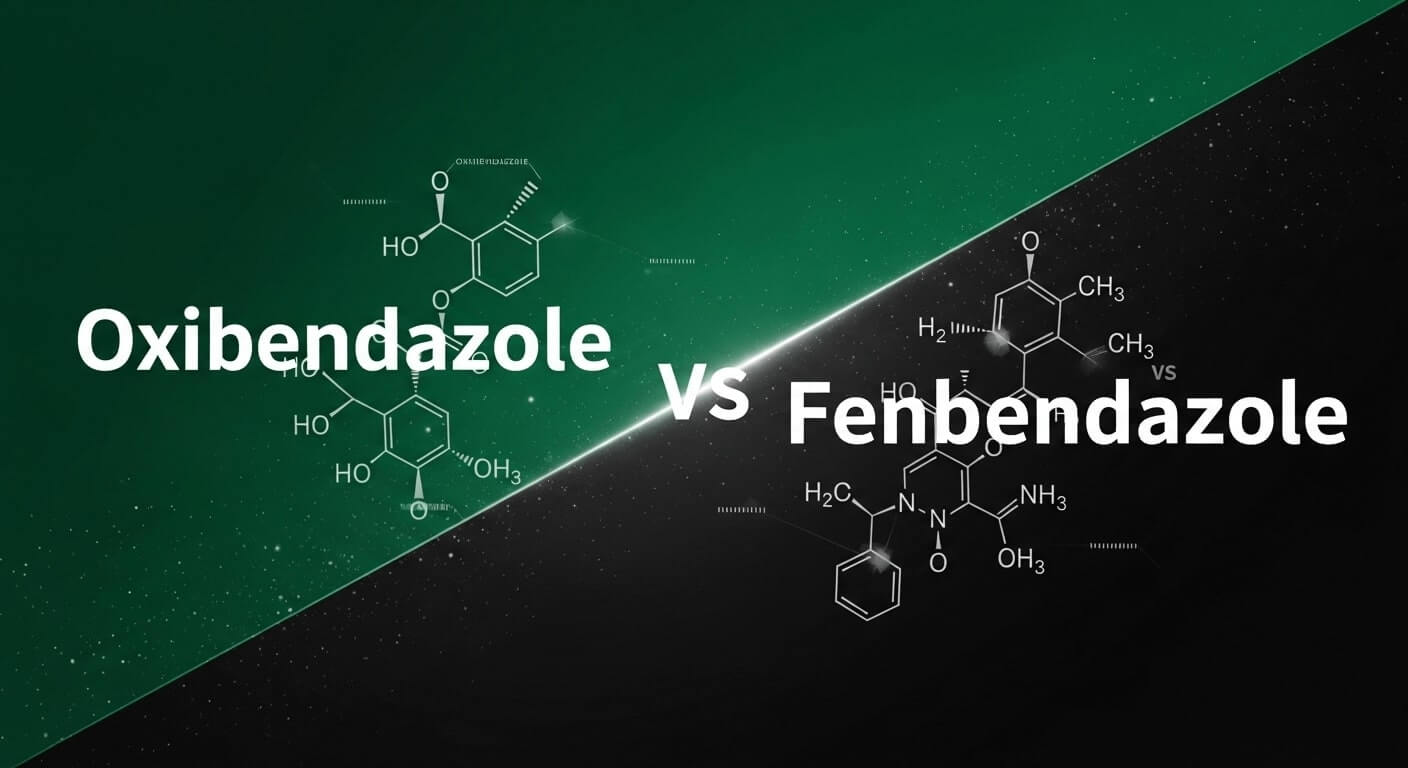
When it comes to deworming medications for animals, oxibendazole vs fenbendazole is a common comparison among veterinarians and pet owners. Both are broad-spectrum anthelmintics used to treat parasitic infections, but they have key differences in their effectiveness, spectrum of activity, and applications.
In this comprehensive guide, we’ll explore the similarities and differences between oxibendazole vs fenbendazole, helping you decide which is best for your needs.
1. What Are Oxibendazole and Fenbendazole?
Oxibendazole
Oxibendazole is a benzimidazole-class anthelmintic primarily used to treat gastrointestinal parasites in horses, cattle, sheep, and pigs. It is particularly effective against:
- Large and small strongyles (roundworms)
- Ascarids (Parascaris spp.)
- Pinworms (Oxyuris equi)
Fenbendazole
Fenbendazole is another benzimidazole anthelmintic with a broader spectrum of activity. It is commonly used in dogs, cats, horses, cattle, and even some exotic animals. It targets:
- Roundworms (Toxocara, Toxascaris)
- Hookworms (Ancylostoma, Uncinaria)
- Whipworms (Trichuris vulpis)
- Tapeworms (Taenia spp.)
- Some lungworms (Aelurostrongylus, Filaroides)
2. Mechanism of Action: How Do They Work?
Both oxibendazole vs fenbendazole work by disrupting the energy metabolism of parasites. They bind to tubulin, a protein essential for microtubule formation, inhibiting glucose uptake and leading to parasite starvation and death.
However, fenbendazole has a slightly broader mechanism, making it effective against more parasite species, including some larval stages.
3. Spectrum of Activity: Which Parasites Do They Treat?
Oxibendazole’s Key Targets
- Strongyles (large and small)
- Ascarids
- Pinworms
Fenbendazole’s Key Targets
- Roundworms
- Hookworms
- Whipworms
- Some tapeworms
- Lungworms
Winner: Fenbendazole has a wider range of effectiveness, making it more versatile in oxibendazole vs fenbendazole comparisons.
4. Safety and Side Effects
Both drugs are generally safe when used at recommended doses, but there are differences in tolerance.
Oxibendazole Safety
- Well-tolerated in horses and livestock
- Rare side effects (mild diarrhea or lethargy)
Fenbendazole Safety
- Safe for dogs, cats, and livestock
- Possible side effects: vomiting, diarrhea (if overdosed)
- Not recommended for pregnant animals without veterinary advice
Winner: Both are safe, but fenbendazole has more reported side effects in sensitive animals.
5. Dosage and Administration
Oxibendazole Dosage
- Horses: 10-15 mg/kg orally
- Cattle/Sheep: 5-10 mg/kg
Fenbendazole Dosage
- Dogs/Cats: 50 mg/kg for 3-5 days
- Horses: 5-10 mg/kg
- Cattle: 5 mg/kg
Winner: Fenbendazole often requires multiple doses, while oxibendazole is usually a single-dose treatment.
6. Resistance Issues
Parasite resistance is a growing concern in oxibendazole vs fenbendazole use. Some parasites (especially small strongyles in horses) have developed resistance to benzimidazoles.
- Oxibendazole resistance has been reported in strongyles.
- Fenbendazole resistance is seen in some hookworm and roundworm strains.
Solution: Rotate dewormers or use fecal egg count tests to monitor effectiveness.
7. Cost and Availability
- Oxibendazole is less common and may be harder to find.
- Fenbendazole is widely available (e.g., Panacur, Safe-Guard).
Winner: Fenbendazole is more accessible and often more cost-effective.
8. Which One Should You Choose?
The choice between oxibendazole vs fenbendazole depends on:
- Target Parasites: Fenbendazole for broader coverage.
- Animal Species: Oxibendazole for horses, fenbendazole for dogs/cats.
- Resistance Status: Check local parasite resistance trends.
9. Frequently Asked Questions (FAQs)
Q: Can I use oxibendazole and fenbendazole together?
A: Not usually recommended unless prescribed by a vet.
Q: Which is better for whipworms in dogs?
A: Fenbendazole is the preferred choice.
Q: Is fenbendazole safe for puppies?
A: Yes, but follow vet-recommended dosages.
10. Final Verdict: Oxibendazole vs Fenbendazole
Both drugs are effective, but fenbendazole offers broader parasite coverage, while oxibendazole is more specific for strongyles and ascarids. Your choice should depend on the parasites you’re targeting and the animal species involved.
For most pet owners, fenbendazole is the more versatile option in the oxibendazole vs fenbendazole debate. However, consult your veterinarian for the best deworming strategy.
Conclusion
Understanding the differences between oxibendazole vs fenbendazole helps in making informed deworming decisions. While both are effective, fenbendazole stands out for its wide-ranging efficacy, making it a top choice for many veterinarians.
If you’re still unsure about oxibendazole vs fenbendazole, consult your vet for personalized advice.


Comments (0)
Leave A Comment